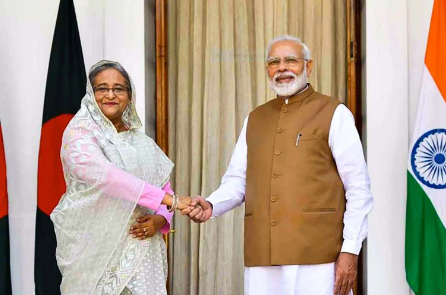Bangladesh’s Leadership Transition Poses Risks to India Relations
Since Sheikh Hasina became Prime Minister of Bangladesh in 2009, the country has built a strong relationship with India. This partnership is based on working together against terrorism and sharing economic and cultural interests. However, leadership changes could threaten this relationship, potentially affecting trade, travel, and a planned Free Trade Agreement (FTA).
Bi-lateral Trade
India and Bangladesh are important economic partners, with Bangladesh being India’s largest trade partner in the region. In the financial year 2023-24, their trade reached $13 billion. India mainly exports cotton (34.9% of total exports) and petroleum products to Bangladesh, while Bangladesh exports mostly readymade garments to India.
The potential of a Free Trade Agreement
Talks about an FTA started in October 2023. The aim is to reduce customs duties between the two countries, boosting trade and investment. Studies suggest that a full FTA could increase Bangladeshi exports to India by up to 182%, and with better infrastructure, this could rise to 297%. India’s exports could also increase by 172%.
Infrastructure & Connectivity
Infrastructure development is a crucial part of India-Bangladesh relations. Since 2016, India has provided $8 billion in credit for projects, including rail and port developments. New projects, like the Akhaura-Agartala rail link, have significantly cut travel times and boosted trade and tourism. A strained relationship could disrupt India’s access to the Northeast, complicating logistics and connectivity between the two countries.
Current Transport Routes
Besides improved rail links, five bus routes facilitate travel between India and Bangladesh. Agreements to use ports like Chittagong and Mongla aim to make cargo movement easier, strengthening commercial ties further.
About India-Bangladesh Trade Agreement
- Enhanced Bilateral Trade: The India-Bangladesh Trade Agreement, in place since 2011, aims to strengthen trade relations by providing duty-free access for 97% of Bangladeshi products, significantly boosting bilateral trade.
- Key Trade Elements: Despite India having a trade deficit with Bangladesh, major exports include mineral fuels and machinery, while significant traded items between the countries are garments and pharmaceuticals.
- Trade Facilitation and Cooperation: The agreement focuses on improving trade facilitation, customs cooperation, and sanitary standards, supported by various joint working groups to resolve trade disputes and enhance connectivity through rail and waterways.
Month: Current Affairs - August, 2024
Category: International / World Current Affairs







